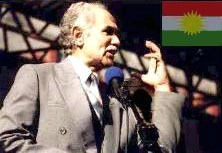|
|

|
 |
|
|
-
On the SOCIALIST PARTY OF KURDISTAN
(PSK)
-
and its SECRETARY GENERAL KEMAL
BURKAY
 The
Party was founded at the end of 1974 under the name "Socialist
Party of Turkish Kurdistan" (PSKT). The territory within which
it organizes and carries out its activities is Turkish Kurdistan.
It has been forced to pursue its organizational and other activities
illegally because in Turkey it is forbidden for Kurdish political
parties to be legally active. The
Party was founded at the end of 1974 under the name "Socialist
Party of Turkish Kurdistan" (PSKT). The territory within which
it organizes and carries out its activities is Turkish Kurdistan.
It has been forced to pursue its organizational and other activities
illegally because in Turkey it is forbidden for Kurdish political
parties to be legally active.-
- At the Third Congress of the Party
in 1993, its name was changed to the Socialist Party of Kurdistan
(PSK). At the same time, some components of its program were changed
and its stance with regard to the transition to socialism was
redefined.
-
- The goals of the program are to
bring about a national democratic revolution (the liberation of
the Kurdish people from the yoke of foreign domination, the implementation
of comprehensive land reform, and other measures for safeguarding
a free and democratic society).
-
- In the long term, the aim is a
socialist society. The PSK's aim is a transition to, and the creation
of, socialism using solely peaceful means in a pluralistic and
democratic society with a multiparty political system.
-
- From 1974 until the military coup
in September 1980, the PSK effectively used both legal and semi-legal
measures and methods. Its theoretical monthly journal "ôzgÅrlÅk
Yolu" (The Road to Freedom), which was published legally, had
a circulation of 10,000 and its bimonthly newspaper "Roja Welat"
(Sun of the Homeland), published in Kurdish and Turkish, had a
circulation of 40,000. These publishing activities were carried
out under extremely difficult conditions and continuous pressure
from the authorities. The military regime has definitively banned
these publications. However, the party has succeeded in continuing
its publication activities in various forms both within Turkey
and abroad.
-
- Soon after its foundation, the
Party began its organizational work within the labor unions and
youth organizations, and developed into a popular force. In the
1977 local elections in Diyarbakir and the 1979 elections in Agri,
the independent mayoral candidates supported by the Party were
elected.
-
- After the coup in September 1980,
a significant number of Party members and officials were arrested,
and a number of others were forced to flee abroad. These events
inflicted deep wounds on the Party's membership. Nonetheless,
after some time the Party was able to recover from this shock
and reorganize. Since that time, the PSK has once again become
an important force in the politics of the country, through its
use of both legal and semi-legal means, and has a significant
influence.
-
- In the meantime, the Turkish regime
continues to terrorize the Kurdish movement. At the same time
it is trying to equate the Kurdish national movement with the
PKK (Workers' Party of Kurdistan) and to mislead public opinion
within the country and abroad by calling its own methods "combating
terrorism". The Turkish leadership is also conducting a systematic
blockade of information regarding the PSK in order to propagate
the idea that there are no alternatives within the Kurdish movement.
The fact is, however, that since its foundation the PSK's policy
has been to seek a peaceful and just solution of this problem
and federal republic of Kurds and Turks. In any case, the Turkish
state's persistent practice of terrorism is making it difficult
to continue this policy and blocking the way to a peaceful solution.
-
- Kemal Burkay is one of the Party's
founders, and since its foundation he has served as its Secretary
General. He is 62 years old and worked for a time as a lawyer.
He is also well-known as a poet in Kurdistan and Turkey. To date
he has published more than 20 books in the areas of poetry, politics,
and Kurdish history, in both Kurdish and Turkish.
-
- On account of his political activities
and his published words, Burkay was arrested four times by the
regime of violence, and each time he received prison sentences
of differing lengths. Since 1980 he has been living in exile in
Sweden and continuing his political activities from this base.
|
 |
|
